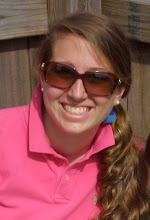2.27.2010
Investing in People
2.16.2010
Camp + Facebook = Conversation
I've been going through old pictures trying to find fun things to put on there, which has been really fun in itself--I love seeing what camp looked like back in the 60's and 70's, and it's been making me think about many of my own memories from camp. But I think my favorite part has been trying to guess a question that will resonate with our "fans". Some I think more alumni will respond to, others current campers and staff--it's fun to see which I'm right about, and which posts end up being popular, and which don't.
So far, this picture of the waterfront in 1968 has gotten the most responses--and it has been great to hear everyone's memories related to the waterfront! I laughed out loud reading some of them, and I hope that our camp community is having just as much fun seeing what we post on facebook as I am having deciding what to post and reading the responses!

2.13.2010
2.10.2010
Thoughts on Customer Service & Critical Thinking
"Many organizations go out of their way to hire people who color inside the
lines, who demonstrate consistency and compliance. And then these
organizations give these people jobs where they are managed via fear."
(Pg 97)
This helps explain a lot of the bad customer service at places like cell phone stores and some of the crazy TSA airport security incidents--in following orders, people don't have the freedom to make judgements and decisions on a case by case basis. Everything is done strictly by the book, and in being scared to stray away from the pre-written rules, customers are alienated, because the rules don't always work for every situation.
So... as I do with most things, I started thinking about all of this through the lens of camp. How does it apply to us?
Camp is a great place to learn to deliver customer service. We deal with so many unique situations, that sticking strictly to the rules taught during staff training doesn't always work. Of course, there are important rules to learn before the summer starts but there is no way to come up with a rule to cover every single possible situation. And so camp staff are taught to think on their feet, to refer to the rules but then to improvise to make sure we are dealing with the situation at hand--not some pre-fabricated situation with a ready-made set of rules.
I think that one of the greatest benefits that camp can give to their staff members--and their campers--is teaching them how to make choices and decisions by using critical thinking skills.
I remember Sunday night after Sunday night during the summer, sitting in the dining hall with a new batch of campers, while our director would go over the rules for camp. They were quite simple--in fact, most know them as the YMCA Character Traits of honesty, respect, responsibility, and caring. Every Sunday he would tell us that those character traits summed up the rules for camp--and they do. If you take the time to run your decisions past those filters, you usually come up with the right answers.
If you are working anywhere that deals with people--most likely you will encounter situations that can't quite fit into the boxes we have set out, neatly organized by rules. But with a little bit of critical thinking, and the right filters to run your decisions by--you'll probably be just fine.
Rules can change and be hard to keep track of. Kids are going to school in an era that is more and more focused on teaching to the test, and less and less focused on letting them think for themselves. The less kids learn about critical thinking in school, the more valuable the camp experience becomes.




